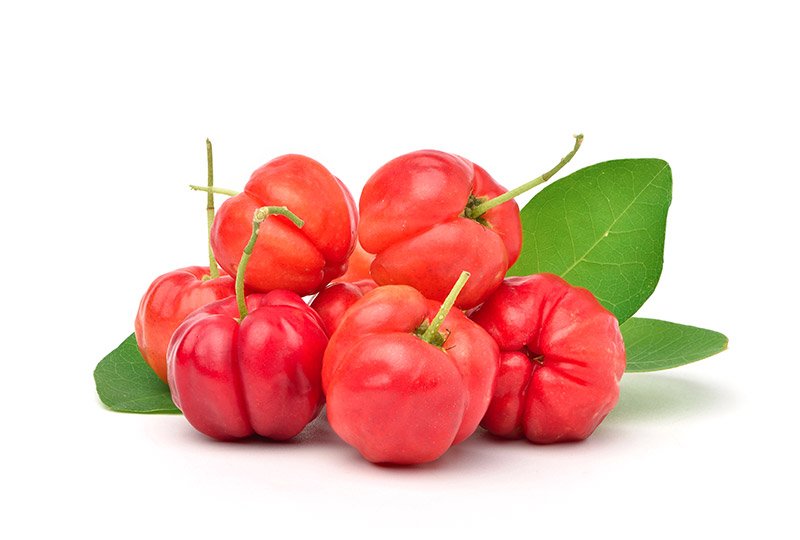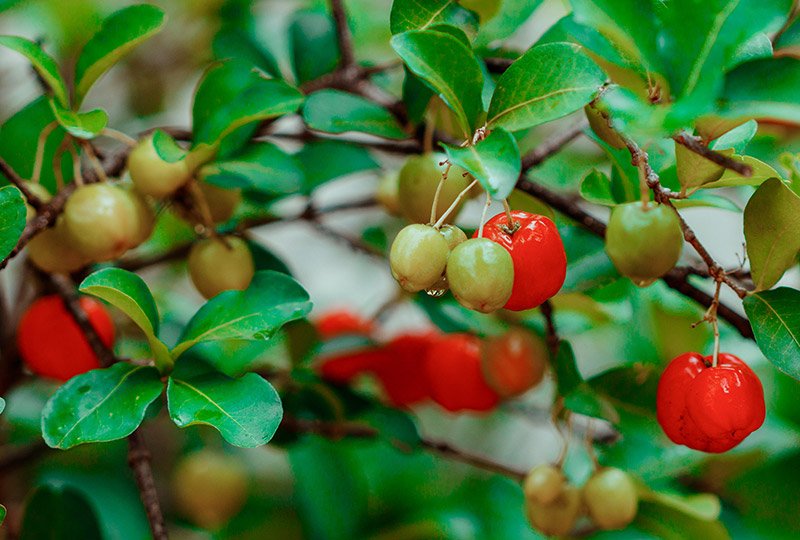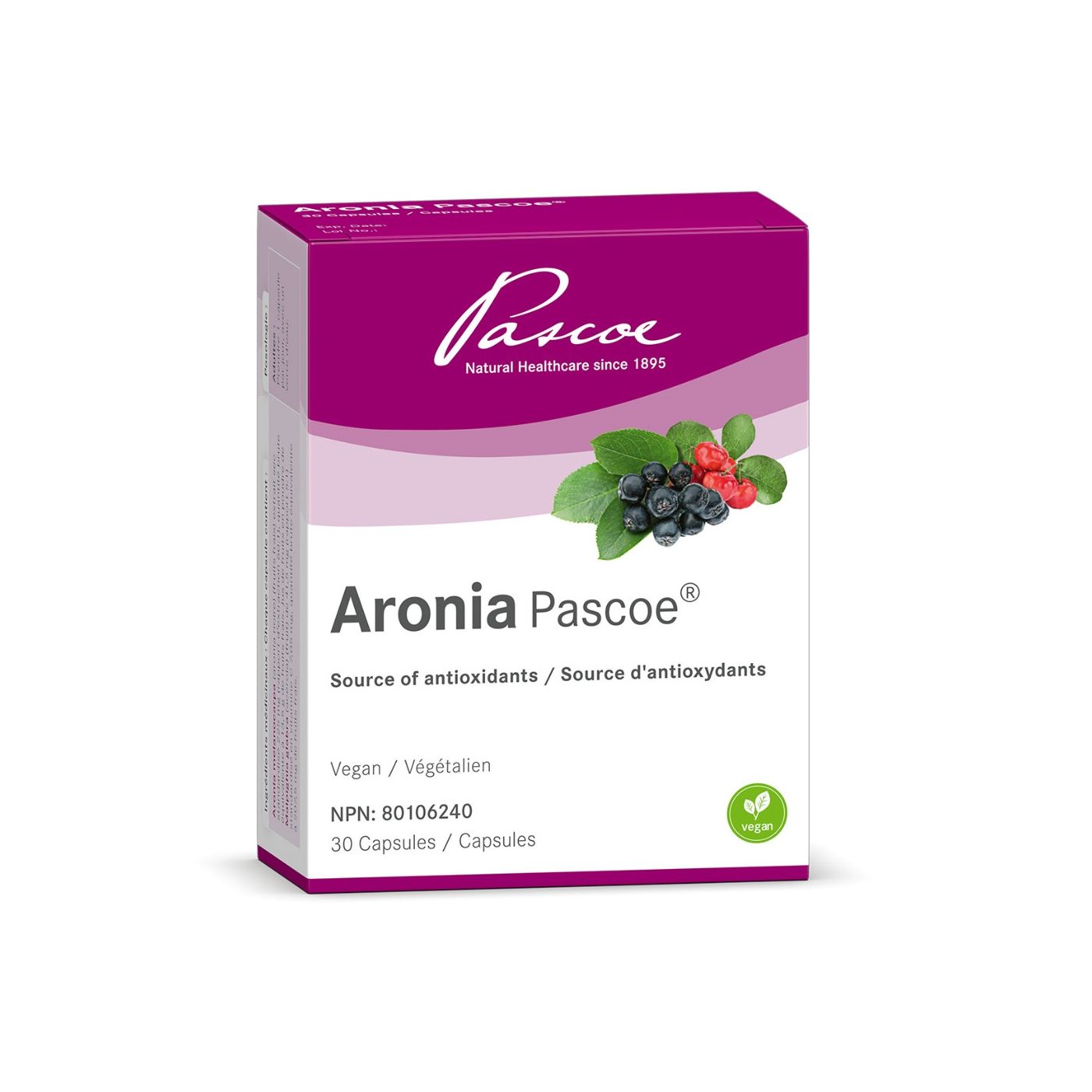Thyme


Acerola
Acerola (Malpighia emarginata) is a tropical bushy shrub or small tree. It is native to South America, Central America, Mexico, and the Caribbean. The evergreen plant produces fruits that are similar to cherries and turn deep red when ripe.
These so-called acerola cherries are known to be one of the richest natural sources of ascorbic acid in the world. Fresh acerola juice contains 13 times more vitamin C than an equal portion of orange juice.
Traditional medicine used the berries as astringent and as treatment for liver disorders, diarrhea, dysentery, fever, coughs, and colds.
In 1950, the plant was introduced to Brazil by researchers who brought the first seeds from Puerto Rico. Since then, the popularity of the tropical fruit has increased. It is now widely exported throughout the world.
Currently, Brazil is the largest producer of the red fruits. They are mainly used to make jams, juices, syrups, and sauces.
Acerola cherries can also be eaten raw but are highly perishable. That is why they are often available in powdered form, as acerola tablets, or as capsules.
Acerola cherry extract is a potent source of antioxidants. That is why it is used in dietary supplements but also in skin care products. Some people not only use acerola for skin benefits but also for their hair care.
Origin and types
Growing throughout the Caribbean, the Acerola shrub is also known as Barbados cherry or West Indian cherry. However, the plant is not related to cherries.
Acerola belongs to the Malpighiaceae family. This plant family consists of vines, shrubs, or trees and is also known as Barbados cherry family.
After some taxonomic confusion, Malpighia emarginata DC. has been accepted as the present scientific name of the plant. Its synonyms Malpighia glabra L. or Malpighia punicifolia are from the past but still used sometimes.
Some sources say that M. glabra, also known as Escobillo, is the wild species whereas M. emarginata is the cultivated species.
What does the plant look like?
The evergreen shrub grows usually about 2 to 3 meters tall but can sometimes reach up to 6 meters. It is bushy with spreading branches and small dark green leaves.
The young leaves bear white hairs that can irritate the skin. The mature leaves are hairless and glossy.
Small, 5-petaled flowers bloom year-round in warmer climates. The flowers are pale to deep pink and grow in clusters of three to five.
They are followed by cherry-like drupes. These acerola cherries ripe from green to a shiny, bright red color. They contain yellow to orange, juicy pulp with several small seeds.
The fruits taste tart to sweet tart. They go bad quickly once removed from the tree which makes handling and storage difficult.


Where does the name come from?
The common name ‘acerola’ is thought to come from Spanish colonists. Apparently, they named the shrub after a species of hawthorn called Azarole (Crataegus azarolus) for their similar tart fruits.
Acerola as a medicinal plant
Acerola cherries are one of the richest sources of ascorbic acid, known as vitamin C. The amount of acerola’s vitamin C ranges from 1500 to 4500 mg per 100 g, which is around 50 to 100 times that of oranges or lemons.
However, the acerola cherry vitamin C content is highest in green and lowest in fully ripened fruits. It also varies with the season and climate.
Vitamin C is an essential coenzyme that is required for normal metabolic function. Whereas many animals can synthesize it from glucose, humans must obtain it from their diet. Since it is soluble in water, vitamin C is not stored in our body and needs to be taken in daily.
This vitamin is known to strengthen the immune system and to build collagen cells. It also supports the respiratory system. Deficiencies can result in scurvy, a potentially fatal disease.
Often people compare the benefits of acerola vs ascorbic acid. Some research findings suggest that certain compounds of acerola juice promote the absorption of vitamin C in humans. But it is not definite yet if the naturally derived form is superior to synthetic vitamin C.
Including the fruit into one’s diet might be still beneficial since it also contains several other vitamins and minerals. The pro-vitamin A level in acerola cherries is about the same as in carrots.
Studies confirmed that the fruit is also rich in antioxidants. These compounds are known to help prevent cell damage from free radicals. The combination of vitamin C and other antioxidants might help protect the body from degenerative diseases, inflammation, and infections.
Moreover, research showed that the acerola cherry can benefit the skin even more. Concentrated acerola cherry extract had skin whitening effects on UV-induced pigmentation. This makes it a major ingredient in facial skincare products to help against cellular aging.
Medicinal Properties of Acerola
Research supports acerola fruits and juice as a high source of vitamin C and a significant source of antioxidants.
Acerola’s benefits for the skin include skin whitening and potential help with anti-aging. Also, certain antibacterial and liver supporting effects have been described for fruit juice. Still, more research is needed.
Vitamin C plays a vital role in:
- Supporting the immune function
- Protecting against free radicals (antioxidant)
- Wound healing
- Collagen formation
- Development / maintenance of cartilage, bones, teeth and gums
How and what is it used for
The fruit is edible and widely consumed in its native area. However, it decomposes very fast and tastes quite acidic. Therefore, acerola is most used for making juices and pulps, vitamin C concentrate, and supplements.
Supplements for personal health care are available in a range of forms. These include acerola cherry tablets, powders, chewables, or capsules.
Acerola cherry extract’s vitamin C is used to prevent vitamin C deficiency. Acerola vitamin C tablets or capsules are also used as an antioxidant nutrient or for cold and flu prevention.
In skincare products, the tropical fruit is used for its anti-aging and astringent effects.
How does it work?
The health benefits of acerola are likely linked to its high vitamin C content. Humans need to get the water soluble vitamin from their diet as they lack the enzyme that is needed for the last step of its production.
The recommended dietary allowances (RDA) of ascorbic acid for adults, 19 years and older, are 75 mg per day for women and 90 mg per day for men.
This amount could be covered by consuming three acerola fruits per day. However, further research is needed on how vitamin C is absorbed and how much reaches the circulation in our body.
What makes Acerola different?
The fruit is known to be one of the highest natural sources of vitamin C. It offers plenty of health benefits, is low in calories, and has a sweet-tart taste.


Cautions and drug interactions
Acerola is regarded as possibly safe for most adults when taken by mouth in doses under 2000 mg of vitamin C per day.
Acerola cherry side effects are the same as for vitamin C supplements in general. You may experience gastrointestinal distress if you take too much. Prolonged, massive dosage may predispose to formation of kidney stones.
There is some concern that large amounts of vitamin C might affect chemotherapy drugs. Large amounts can also theoretically interact with fluphenazine (Prolixin), warfarin (Coumadin), and estrogens.
Pregnant or breast-feeding women should exercise caution with the tropical fruits as there is not enough data available.
As always, discuss with your doctor before starting any new health product, especially if you are on medication.
Pascoe products that contain Acerola:
Disclaimer
Pascoe Canada does not offer health or medical advice as we are not a healthcare practitioner. Please speak with your healthcare practitioner before beginning any program related to nutrition, diet, exercise, fitness, medical, and/or wellness. All content published by Pascoe Canada is developed through collaborating with licensed medical professionals and contributors. This includes text, graphics, images, and other material on the website, newsletter, and products (“Content”). This content is for informational purposes only and does not constitute medical advice. The content does not substitute professional medical advice, diagnosis, or treatment. Please always do your own research on whether this is for you along with your healthcare practitioner advice. Always consult your healthcare practitioner prior to use specific herbs because you might have underlined conditions needs professional care. The content is general in nature and are subject to change. It is not intended to cover all possible uses, directions, precautions, warnings, drug interactions, allergic reactions, or adverse effects.


